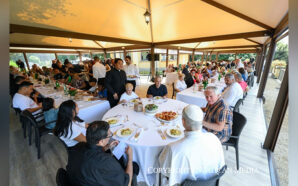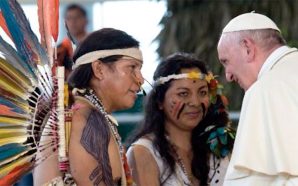As a Pope who took the name Francis, it shouldn’t have been surprising that his first* and seminal encyclical, Laudato Si’, focused on the environment.
The encyclical is named after St Francis of Assisi’s famous ‘Canticle of the Creatures’ and sets a bold vision for caring for our common home.
While previous popes (Pope St John Paul II and Pope Benedict XVI) had written about the environment in other encyclicals or papal allocutions, Laudato Si’ was the first encyclical entirely focused on the environment, marking a pivotal moment in the Church’s engagement with ecological issues.
Pope Francis was making a very obvious point. Not only did he place climate change and environmental issues front and centre on our moral radar, but he eloquently entwined both ecological degradation and social injustice, clarifying that any solutions must address both ecological wellbeing AND human wellbeing.
Published in 2015, Laudato Si’ was lauded by many as a “watershed” moment, as it coincided with the Paris climate conference and is recognised as influencing the deliberations and outcomes of the Paris Agreement.
However, Laudato Si’ is not just about creating headlines or ‘moments’. Pope Francis was calling all God’s people to a deeper conversion to how we approach God’s creation and move beyond a purely technical view of the environment to a more spiritual and ethical understanding.
Pope Francis stressed the interconnectedness of all things – within the natural world and between humanity and nature. He emphasised a relational approach that includes God, humanity, and the Earth, highlighting the idea that “everything is connected” and we all have a role to play as stewards of the Earth.
As Dr Sandie Cornish from ACU states: “Rather than being about climate change, it is an encyclical about the need for human change. It goes deeper than the presenting issue, addressing the roots of climate change in human behaviour. And it goes deeper still by addressing how this human behaviour reflects a misunderstanding – or worse a rejection – of who and what we humans are. It calls for a renewed anthropology.”
As she continues: “One of the foundations of this spirituality is the understanding that all that is has been loved into being by God – including us. God is the Creator and we are creatures. The universe is not random and chaotic, it is a cosmos imbued with meaning and order.”
This new approach has had an expansive impact globally and locally. The Vatican Dicastery for Promoting Integral Human Development is the sponsor of the Laudato Si’ Action Platform that advocates for, and assists all organisations, groups and individuals to create their own plans of action.
In Australia, our Catholic Bishops invited all Catholics to “uncover the sacramentality of Creation” in recognising the divine presence in the world, and to respond with wonder and awe. They called for a “profound conversion expressed in a new way of living, both personally and collectively”.
Our bishops confirmed: “We are being called to a new way of thinking, feeling, understanding and living.”
Bishop Vincent Long OFM Conv launched the ACBC’s Social Justice Statement for 2021-22 Cry of the Earth, Cry of the Poor, with a commitment to a seven-year journey towards seven Laudato Si’ Goals.
“As a global Catholic community, our own words of praise to God for creation are only made meaningful when our collective actions reflect that same sense of love and respect for our common home. Only when we act together for a more just and sustainable world will things change for the better,” he said.
In the Diocese of Parramatta, parishes, schools, groups and organisations have banded together to create meaningful change and respond with “wonder and awe”. There are several registered Earthcare Parishes and Schools, workshops, ecological spirituality days, self-assessment tools and more. More than conversations, real action is taking place on a local level where young and old are taking responsibility to help heal, restore and improve this Earth for generations to come.
And that was all Pope Francis was asking for – “for we know that things can change. The Creator does not abandon us; he never forsakes his loving plan or repents of having created us. Humanity still has the ability to work together in building our common home.” (Laudato Si’, 13)
*Pope Francis’ first entirely authored encyclical. His “first” encyclical, Lumen Fidei, was largely written by Pope Benedict XVI. After his retirement, the document was passed to Pope Francis, who completed and finalised the document.
This article was originally published in the 2025 Ordinary Time | Winter edition of the Catholic Outlook Magazine. You can read the digital version here or pick up a copy in your local parish.








